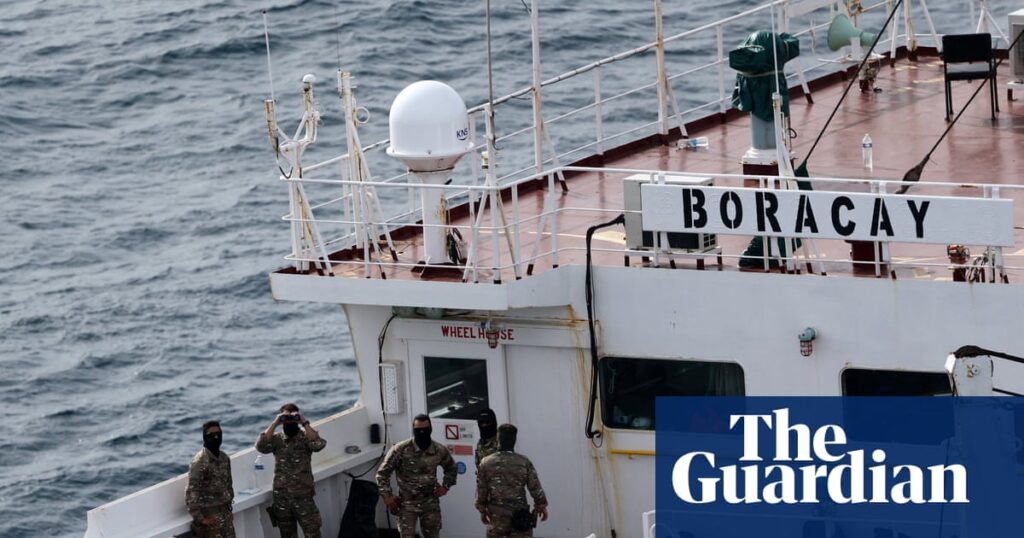The captain of an oil tanker that authorities in France have detained off the country’s Atlantic coast and that President Emmanuel Macron has linked to Russia will go on trial in February over the crew’s alleged refusal to cooperate, a French prosecutor has said.
Macron has alleged that the tanker belongs to Russia’s “shadow fleet” of ageing tankers of uncertain ownership that are avoiding western sanctions over Moscow’s war in Ukraine. He also did not rule out that it could have been involved in drone flights over Denmark as it was sailing last week off the coast of the Nordic country.
The Russian president, Vladimir Putin, denounced the tanker’s detention as an act of piracy and alleged that Macron had initiated the move for domestic policy reasons.
“There is no other way to deflect attention of the population, citizens of France from difficult internal problems that are hard to solve,” Putin said at a forum of foreign policy experts in Russia’s Black Sea resort of Sochi.
Asked whether the tanker could be linked to drones flights, Macron said: “I’m very cautious because our services and our justice are still working … I don’t exclude it at all, but I cannot here attribute very clearly and establish a clear link between these two phenomenon.”
Putin emphasised that “there was no reason whatsoever for seizing the tanker in neutral waters”, adding that “there wasn’t and couldn’t be” any military cargo or drones. He also warned that such action could provoke confrontation.
“It’s piracy, and how do you deal with pirates?” Putin said. “You destroy them. It doesn’t mean that tomorrow a war will erupt all across the global ocean, but certainly the risk of confrontation will seriously increase.”
Speaking at a European summit in Copenhagen, Denmark, Macron said the French navy had faced “inappropriate and extremely aggressive behaviour” towards the French frigate and helicopters that had been deployed to board the tanker, which justified the opening of a judicial investigation.
Stéphane Kellenberger, the prosecutor of the western port city of Brest, said two Chinese crew members, the captain and the chief mate, who had been detained since Tuesday, had been released from police custody. The chief mate has been released without charge.
A preliminary investigation was opened into the crew’s “refusal to cooperate” and “failure to justify the nationality of the vessel” after the Atlantic maritime prefect alerted justice authorities on Monday, Kellenberger said. The inquiry showed the captain could not be directly considered responsible for the second offence, he added.
Kellenberger said the French navy intervened and boarded the ship on Saturday off France’s Atlantic coast in line with international law when there appeared to be a discrepancy between its apparent nationality and real nationality.
An investigation led by the French navy concluded that the ship, coming from Russia and heading to India with a “large oil shipment”, was flying no flag, he said.
The captain was summoned for trial in Brest on 23 February. He faces up to one year in prison and a €150,000 (£131,000) fine.
French military spokesperson Col Guillaume Vernet said the ship was ordered to stay in place in a safe area.
In comments earlier on Thursday in Copenhagen, Macron praised the work of the French navy to “identify the presence of a shadow fleet”.
“You kill the business model by detaining even for days or weeks these vessels and forcing them to organise themselves differently,” he said.
Macron said “30 to 40%” of Russia’s war effort was “financed through the revenues of the shadow fleet”.
“It represents more than €30bn. So it’s extremely important to increase the pressure on this shadow fleet, because it will clearly reduce the capacity to finance this war effort for Russia,” he said.
Macron said the ship was “exactly the same” as a vessel that was detained by Estonia earlier this year for the same flag issue.
In April, the Estonian public broadcaster EE reported that the ship, then identified under the name “Kiwala”, was stopped outside Tallinn Bay on its way to the Russian port of Ust-Luga. At the time, the prime minister, Kristen Michal, posted on social media that Estonia’s navy had “detained a sanctioned vessel with no flag state” and authorities had boarded the ship.
The ship, now known as “Pushpa” or “Boracay”, left the Russian oil terminal in Primorsk near St Petersburg on 20 September and sailed off the coast of Denmark. It has remained off the coast of the French western port of Saint-Nazaire since Sunday, according to the Marine Traffic monitoring website.
The tanker, whose name has changed several times, was sailing under the flag of Benin and appears on a list of ships targeted by European Union sanctions against Russia.
Questioned by journalists, the Kremlin spokesperson Dmitry Peskov said he had “no information” on the ship. He also said many countries were carrying out “provocative actions” against Russia.
The “shadow fleet” is made up of used, ageing tankers that were often bought by nontransparent entities with addresses from countries that have not imposed sanctions on Russia to help Russia’s oil exporters elude the price cap imposed by Ukraine’s allies.

